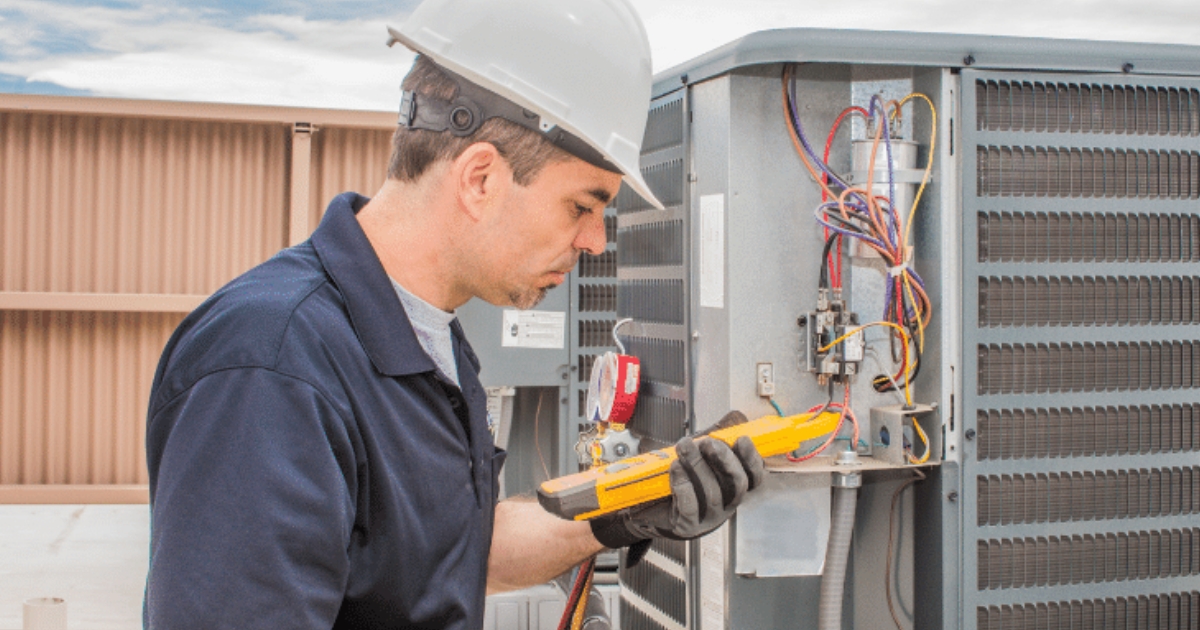Why HVAC Maintenance is Essential
How often should HVAC be serviced? If you’re looking for a quick answer, homeowners should schedule HVAC maintenance at least once a year. For optimal performance and efficiency, consider servicing your system in the spring before the cooling season and in the fall before the heating season.
AC service involves specific tasks like changing air filters and inspecting key components. But remember, it’s far better to have a tune-up at all than to avoid it entirely.
Neglecting HVAC maintenance can have far-reaching consequences.
Regular servicing keeps your system in tip-top shape—it ensures efficiency, catches issues before they turn into costly repairs, and extends the life of your equipment. Having your HVAC system serviced regularly is crucial, with biannual check-ups recommended at the beginning of summer and winter.
Imagine your HVAC system tuning out on the hottest or coldest day of the year; routine check-ups can prevent these inconvenient breakdowns.
At Indoor Air Systems, we understand how crucial it is for your home to stay comfortable year-round. Efficiency and reliability are our top priorities. Regular maintenance also helps in reducing your energy bills, as a well-maintained HVAC system runs more efficiently.
Therefore, investing in twice-yearly check-ups can save money in the long run by avoiding major repairs and improving energy use.
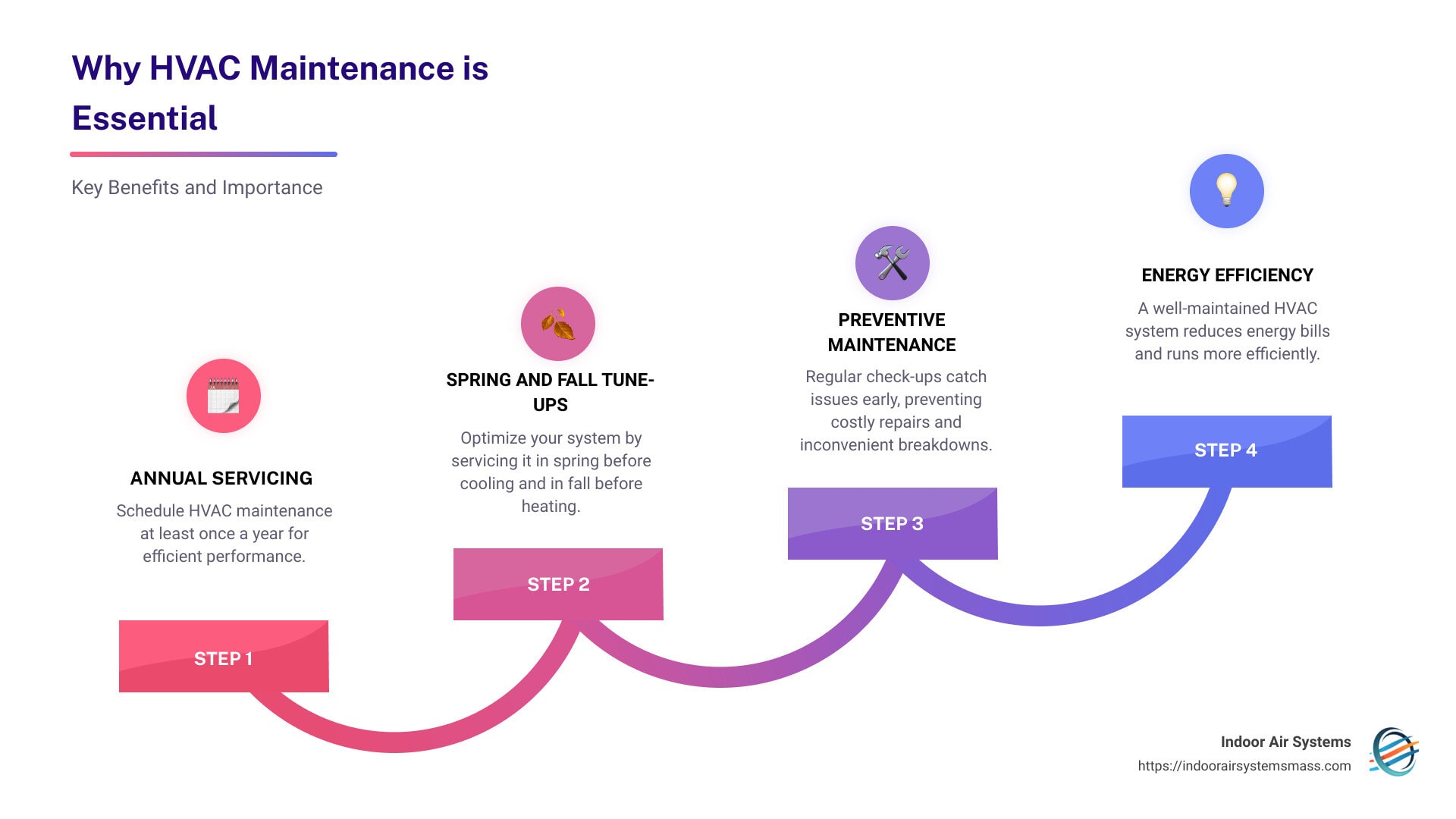
Table of Contents
Step 1: Understand the Basics of HVAC Maintenance
What is HVAC Maintenance?
HVAC maintenance involves a series of tasks aimed at keeping your heating, ventilation, and air conditioning system running smoothly. Regular air conditioning maintenance, including comprehensive inspections and repairs, can enhance the lifespan of AC units and reduce costs. These tasks can be divided into two main categories: DIY tasks and professional inspections.
DIY Tasks:
- Replace air filters: Change your air filters regularly, typically every 1-3 months, to ensure good airflow and reduce dust and allergens.
- Clean air vents: Wipe down vents to remove dust and debris that can obstruct airflow.
- Inspect the area around the unit: Ensure there’s no debris or vegetation blocking the exterior unit.
Professional Inspections:
- System cleaning: Professionals will clean the coils, fins, and other components that are hard to reach.
- Inspection and tune-ups: They will check for any issues, lubricate moving parts, and ensure the system is operating efficiently.
- Efficiency adjustments: Professionals can make adjustments to improve system performance and energy efficiency.
- Indoor and outdoor coils: Cleaning and inspecting indoor and outdoor coils are crucial to ensure the air conditioning system functions efficiently and remains in good repair.
Why is HVAC Maintenance Important?
Regular HVAC maintenance has numerous benefits, including efficiency, longevity, cost savings, and safety.
Efficiency: A well-maintained HVAC system runs more efficiently, using less energy to heat or cool your home. This not only keeps your home comfortable but also reduces your energy bills. For example, a dirty filter or clogged vent can make your system work harder, consuming more energy and increasing costs.
Longevity: Routine maintenance helps extend the life of your HVAC system. By catching small issues before they become major problems, you can avoid costly repairs or premature system replacement. Think of it like regular oil changes for your car; small, consistent care keeps everything running longer.
Cost Savings: While there’s an upfront cost for professional inspections, the long-term savings are significant. Efficient systems use less energy, and regular maintenance can prevent expensive emergency repairs. According to Energy.gov, a well-maintained system can reduce energy bills by up to 15%.
Safety: Safety is another crucial reason for regular HVAC maintenance. Systems that use gas can produce carbon monoxide, a dangerous gas. Ensuring your system is in good working order and maintaining carbon monoxide detectors can protect your household from this invisible threat.
Regular maintenance is essential for keeping your HVAC system in good working order. Indoor Air Systems is dedicated to providing top-notch service to ensure your system runs efficiently and safely.
Next, let’s dive into assessing your HVAC system’s age and usage to determine the ideal maintenance schedule.
Continue reading to learn more about new vs. old systems and how climate and usage impact maintenance needs.
Step 2: Assess Your HVAC System’s Age and Usage
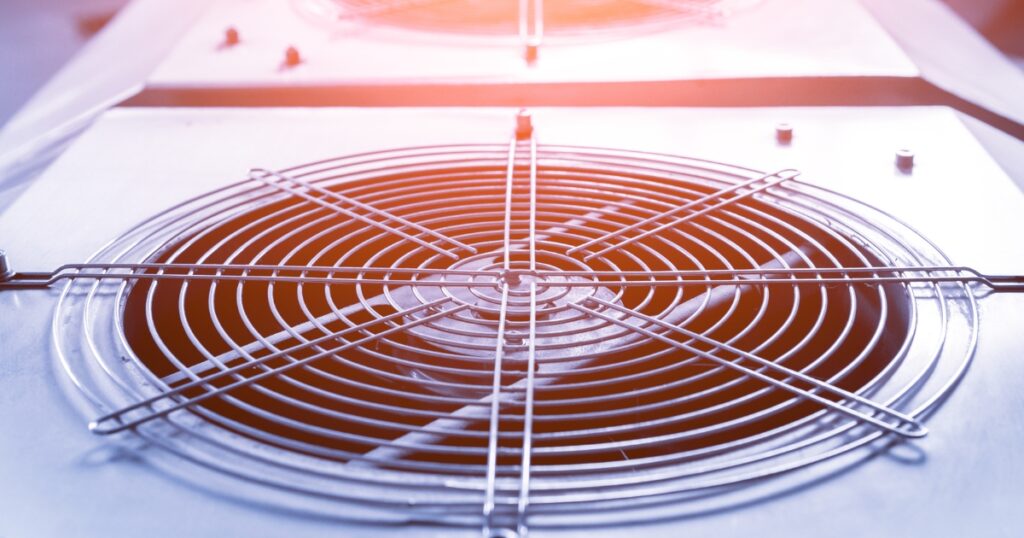
New vs. Old Air Conditioning Units
The age of your HVAC system plays a crucial role in determining how often it should be serviced. New systems are generally more efficient and require less frequent maintenance. However, even new systems benefit from at least annual servicing to ensure they stay in top condition and to catch any potential issues early, such as the AC system blowing warm air or turning on and off unexpectedly.
As systems age, they naturally require more attention. Older systems may need bi-annual check-ups or even more frequent servicing, especially if they have been in operation for many years. Older units are more prone to wear and tear, making regular maintenance essential to prevent breakdowns.
For example, if your HVAC system is over 10 years old, increasing the maintenance frequency can help extend its lifespan and improve efficiency. Think of it like an aging car that needs more frequent oil changes and inspections.
Impact of Climate and Usage
Your HVAC system’s maintenance needs are also influenced by your climate and usage frequency. If you live in a region with extreme weather conditions, your HVAC system works harder and thus requires more frequent maintenance.
- Extreme Weather: In areas with harsh winters or scorching summers, HVAC systems are under constant stress. For instance, homeowners in the southern U.S. often use their air conditioning almost year-round. This high usage means these systems should be serviced twice a year—once before the cooling season and once before the heating season.
- High Usage: If your HVAC system runs continuously or for long periods, it’s essential to schedule more frequent maintenance. High usage can lead to quicker wear and tear, making regular tune-ups vital for keeping the system efficient and avoiding costly repairs.
- Regional Differences: Different regions have varying maintenance needs. For example, a home in a humid area may need more frequent filter changes to handle the extra moisture, which can lead to mold and mildew. Conversely, a home in a dry, dusty region might require more frequent cleaning of air vents and coils to maintain good airflow.
Maintaining your HVAC system according to its age and usage not only ensures it runs efficiently but also helps you save on energy bills and avoid unexpected breakdowns.
Next, let’s explore how to schedule seasonal maintenance to keep your system running smoothly year-round.
Step 3: Schedule Seasonal Maintenance
Regular seasonal maintenance is crucial for keeping your HVAC system in optimal condition. By planning maintenance in the spring and fall, you can ensure your system is ready for the demands of summer cooling and winter heating.
Spring Maintenance Checklist
Spring is the perfect time to prepare your HVAC system for the upcoming cooling season. Here’s what you need to focus on:
- Cooling System Check
- Inspect the AC unit for any visible issues.
- Ensure the cooling system is clean and free from debris.
- Refrigerant Levels
- Check and top up refrigerant levels if necessary.
- Low refrigerant levels can reduce cooling efficiency and increase energy costs.
- Airflow Inspection
- Ensure all vents and registers are open and unobstructed.
- Clean or replace air filters to improve airflow and indoor air quality.
- Coil Cleaning
- Clean the evaporator and condenser coils to remove dirt and debris.
- Dirty coils can reduce the efficiency of your cooling system.
Fall Maintenance Checklist
As temperatures drop, it’s time to get your HVAC system ready for the heating season. Here are the key tasks:
- Heating System Check
- Inspect the furnace or heat pump for any signs of wear or damage.
- Ensure the heating system is clean and functioning properly.
- Furnace Check
- Test the furnace to ensure it ignites and operates correctly.
- Check for any unusual noises or odors that could indicate a problem.
- Safety Inspection
- Inspect carbon monoxide detectors and replace batteries if needed.
- Ensure there are no gas leaks or other safety hazards.
- Ductwork Inspection
- Check ductwork for leaks and seal any gaps to improve heating efficiency.
- Clean air ducts to remove dust and allergens.
By scheduling seasonal maintenance, you can catch potential issues early and ensure your HVAC system runs efficiently throughout the year. This proactive approach helps you avoid unexpected breakdowns and keeps your home comfortable in any season.
Next, let’s look at some regular DIY maintenance tasks you can perform to keep your system in top shape.
Step 4: Perform Regular DIY Maintenance
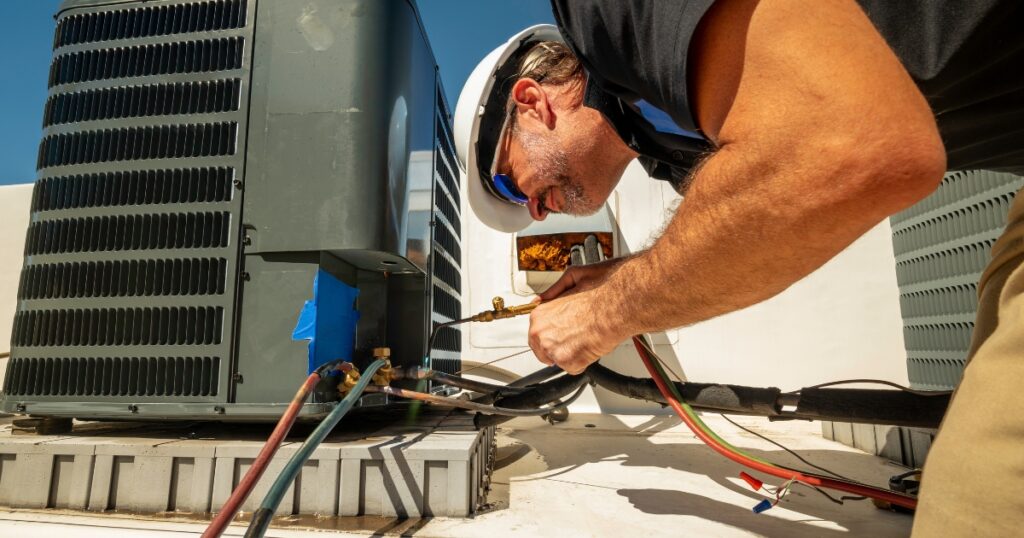
Taking care of your HVAC system doesn’t always require a professional. There are some simple, regular tasks you can do yourself to keep things running smoothly and efficiently. Here’s what to focus on:
Monthly Tasks
Air Filter Replacement
One of the easiest and most effective ways to maintain your HVAC system is by replacing or cleaning the air filter. According to the United States Department of Energy, swapping out a dirty filter with a clean one can reduce your AC’s energy use by 5% to 15%.
- Inspect the filter: Check your filter at least every other month. During peak seasons, do this monthly, especially if you have pets.
- Replace or clean: If you have a reusable filter, wash it out. If it’s disposable, replace it.
Visual Inspection
A quick monthly visual inspection can help you spot potential issues before they become big problems.
- Check for debris: Ensure there are no leaves, dirt, or other debris around your outdoor unit.
- Inspect vents: Make sure all indoor vents are unblocked and clean.
Bi-Annual Routine Maintenance Tasks
Coil Cleaning
Your air conditioner has an evaporator coil on the inside and a condenser coil on the outside. Keeping these coils clean is essential for efficiency. To maintain optimal performance and prevent breakdowns, it’s important to service your air conditioner regularly.
- Evaporator coil: Located inside the unit, this coil can collect dust and dirt. Clean it at least once a year.
- Condenser coil: Found outside, this coil is even more prone to dirt. Clean it twice a year, especially after mowing the lawn or windy days.
Condensate Pump Check
The condensate pump is often overlooked but crucial for system health.
- Inspect the pump: Check it every six months to ensure it’s functioning properly.
- Clean the pump: Remove any dirt or debris to prevent clogging.
Clear the Area Around the Unit
Just as you wouldn’t let anything block your AC vents on the inside, you’ll want to make sure that nothing is crowding your HVAC system on the exterior of your home.
- Remove obstructions: Clear away leaves, grass clippings, and other debris from around the outdoor unit.
- Trim plants: Ensure no plants or bushes are growing too close to the unit.
By performing these regular DIY maintenance tasks, you can extend the life of your HVAC system and keep it running efficiently.
Next, let’s talk about the importance of hiring a professional for annual tune-ups.
Step 5: Hire a Professional for Annual Tune-Ups
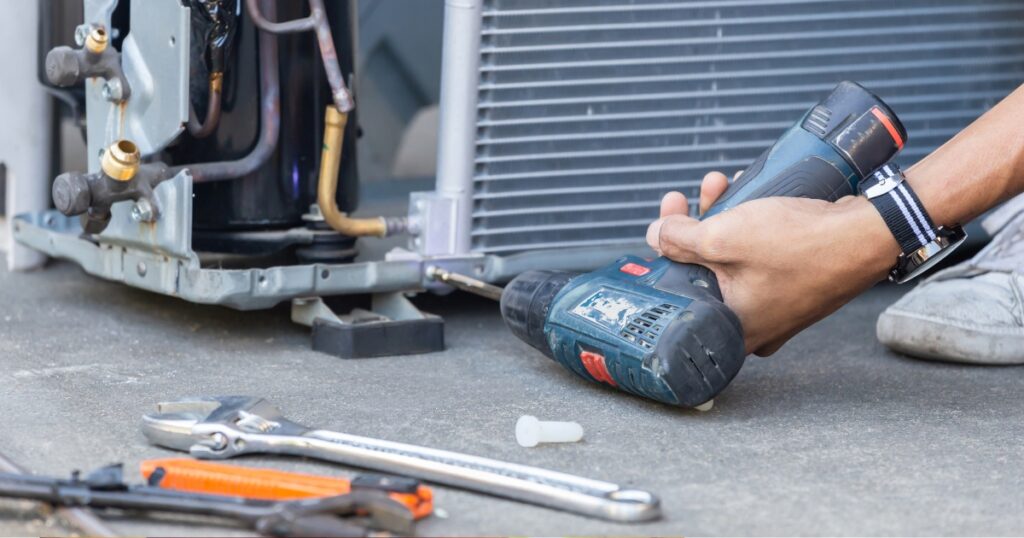
Regular DIY maintenance is essential, but to truly keep your HVAC system in top shape, professional tune-ups are a must. Here’s what you can expect and why it’s worth it.
What to Expect from a Professional Tune-Up
When you hire a professional for an annual tune-up, they will provide a comprehensive check of your entire HVAC system. This isn’t just a quick look; it’s a detailed inspection and servicing that covers all critical components.
System Cleaning
Professionals will clean parts of your HVAC system that are hard to reach, such as the evaporator and condenser coils. Clean coils are vital for efficient operation and can prevent many common issues.
Problem Detection
A trained technician can spot potential problems early. For example, they may find worn-out parts or small leaks that you might miss. Catching these issues early can save you from costly repairs down the line.
Efficiency Adjustments
To ensure your system is running as efficiently as possible, professionals will make necessary adjustments. This can include calibrating the thermostat, tightening electrical connections, and checking refrigerant levels.
Benefits of Professional Maintenance for Energy Efficiency
Regular professional maintenance ensures your HVAC system is reliable, reducing the risk of unexpected breakdowns. This is especially important during extreme weather when you need your system the most.
Cost Savings
While it might seem like an added expense, professional maintenance can actually save you money in the long run. A well-maintained system operates more efficiently, leading to lower energy bills. Plus, catching small issues early can prevent expensive repairs.
Extended Lifespan
Just like a car, your HVAC system will last longer if it’s well-maintained. Investing in annual tune-ups can add years to the life of your system, postponing the need for a costly replacement.
By hiring a professional for annual tune-ups, you’re not just maintaining your HVAC system—you’re investing in your home’s comfort and efficiency.
Identifying Maintenance Needs
Signs that Indicate Your HVAC System Needs Servicing
Blowing Warm Air
If your air conditioner is blowing warm air, it’s a clear sign that your HVAC system needs servicing. This issue can stem from several factors, such as a refrigerant leak, a malfunctioning compressor, or a clogged air filter. Regular maintenance can help identify and address these problems before they escalate into major issues.
It’s essential to have your air conditioner serviced by a professional HVAC technician to ensure it’s running efficiently and effectively. By keeping up with routine air conditioner maintenance, you can prevent warm air from disrupting your comfort and ensure your system operates at peak performance.
Conclusion
Regular HVAC maintenance is crucial for several reasons. It ensures your system runs efficiently, saves you money, and prolongs the life of your equipment. By following a consistent maintenance schedule, you can avoid unexpected breakdowns and costly repairs.
Importance of Regular Maintenance
Efficiency: A well-maintained HVAC system operates at peak efficiency, reducing energy consumption. This means lower utility bills and a smaller carbon footprint.
Cost Savings: Regular maintenance catches small issues before they become big problems. This can save you a significant amount of money on repairs and extend the life of your HVAC system.
Safety: Ensuring your system is in good working order helps maintain safe operation. For example, a faulty furnace can produce dangerous carbon monoxide gas.
Benefits of Regular Maintenance
- Increased Dependability: Routine check-ups make your system more reliable, reducing the chances of sudden failures.
- Prolonged Lifespan: Regular servicing helps your HVAC system last longer, delaying the need for expensive replacements.
- Optimal Performance: Keeping your system clean and tuned ensures it performs at its best, providing you with consistent comfort.
- Healthier Air Quality: Clean filters and ducts mean cleaner air, which is especially important for those with allergies or respiratory issues.
- Environmental Protection: A well-maintained system uses less energy, helping to reduce your environmental impact.
At Indoor Air Systems, we specialize in providing personalized HVAC services custom to your needs. With over 20 years of experience in Central Massachusetts, our team is committed to keeping your home comfortable year-round. Whether it’s a routine maintenance check or an emergency repair, we’re here to help.
Ready to take the next step? Contact us today to schedule your HVAC service and experience the benefits of regular maintenance.
By staying on top of your HVAC maintenance, you ensure a comfortable, safe, and efficient home. Don’t wait for a breakdown to remind you—make regular maintenance a part of your routine with Indoor Air Systems.
Frequently Asked Questions about HVAC Service Frequency
How often should HVAC be serviced?
The short answer: homeowners should schedule HVAC maintenance at least once a year. Ideally, you should have your heating and cooling system checked in the spring and fall to ensure optimal performance and lower electricity costs before the cooling and heating seasons.
Why twice a year?
- Spring: Prepares your air conditioning system for the hot summer months. Technicians will check refrigerant levels, clean coils, and ensure airflow is unobstructed.
- Fall: Gets your heating system ready for winter. This includes inspecting the furnace, checking for safety issues, and ensuring everything works efficiently.
Older Systems: If your HVAC system is older, consider more frequent maintenance. Older systems are prone to more issues and can benefit from bi-annual checks.
Is HVAC tune-up worth it?
Absolutely. Investing in regular HVAC tune-ups provides several benefits:
- Efficiency: A well-maintained system operates more efficiently, reducing energy consumption and lowering your utility bills.
- Cost Savings: Regular tune-ups catch small issues before they become expensive problems, saving you money on repairs.
- Longevity: Routine maintenance extends the life of your HVAC system, delaying the need for a costly replacement.
Can I do HVAC maintenance myself?
Yes, there are several DIY tasks you can perform to keep your HVAC system in good shape. However, some tasks should be left to professionals for safety and efficiency.
DIY Tasks:
- Monthly: Replace the air filter and perform a visual inspection.
- Bi-Annual: Clean the coils and check the condensate pump.
Professional Tasks:
- System Cleaning: Professionals can reach and clean parts you can’t, like evaporator and condenser coils.
- Problem Detection: Technicians can spot and fix issues early, preventing costly repairs.
- Efficiency Adjustments: Professionals can make necessary adjustments to keep your system running efficiently.
Safety Tip: Always turn off the system and unplug it before performing any DIY maintenance to avoid electrocution or starting a fire.
By combining DIY maintenance with annual professional tune-ups, you ensure your HVAC system runs smoothly and efficiently all year round.
Ready to schedule your next HVAC service? Contact Indoor Air Systems today!
Our Content
At Indoor Air Systems, LLC, we provide specialized HVAC services with a personal touch. Serving Central Massachusetts, we focus on the installation and maintenance of mini-split systems, split system air conditioner, heating and cooling system, ensuring efficient and cost-effective heating and cooling solutions. Our locally owned and operated business allows us to offer exceptional customer attention and responsiveness without the high costs associated with larger companies. Choose Indoor Air Systems for reliable, expert service tailored to your specific needs.

